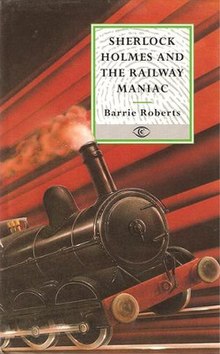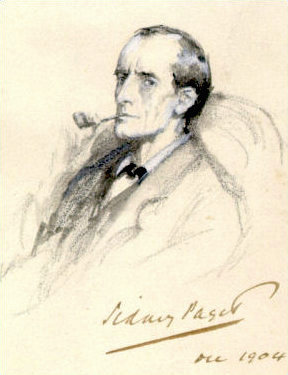
Sherlock Holmes is a fictional detective created by British author Arthur Conan Doyle. Referring to himself as a "consulting detective" in his stories, Holmes is known for his proficiency with observation, deduction, forensic science and logical reasoning that borders on the fantastic, which he employs when investigating cases for a wide variety of clients, including Scotland Yard.

Professor James Moriarty is a fictional character and criminal mastermind created by Sir Arthur Conan Doyle to be a formidable enemy for the author's fictional detective Sherlock Holmes. He was created primarily as a device by which Doyle could kill Holmes and end the hero's stories. Professor Moriarty first appears in the short story "The Adventure of the Final Problem", first published in The Strand Magazine in December 1893. He also plays a role in the final Sherlock Holmes novel The Valley of Fear, but without a direct appearance. Holmes mentions Moriarty in five other stories: "The Adventure of the Empty House", "The Adventure of the Norwood Builder", "The Adventure of the Missing Three-Quarter", "The Adventure of the Illustrious Client", and "His Last Bow".
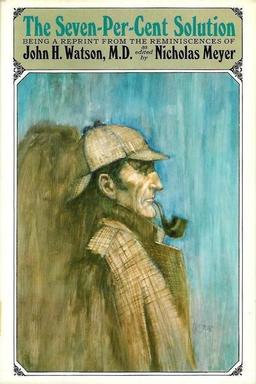
The Seven-Per-Cent Solution: Being a Reprint from the Reminiscences of John H. Watson, M.D. is a 1974 novel by American writer Nicholas Meyer. It is written as a pastiche of a Sherlock Holmes adventure, and was made into a film of the same name in 1976.

The Canary Trainer: From the Memoirs of John H. Watson is a 1993 Sherlock Holmes pastiche by Nicholas Meyer. Like The Seven Percent Solution and The West End Horror, The Canary Trainer was published as a "lost manuscript" of the late Dr. John H. Watson. In "The Adventure of Black Peter", an original Arthur Conan Doyle Holmes story from 1904, Watson mentions that his companion recently arrested "Wilson, the notorious canary-trainer, which removed a plague-spot from the East-End of London." This Wilson is not related to the eponymous character of Meyer's novel. Meyer's "trainer" is Erik, the principal figure of Gaston Leroux's 1910 novel The Phantom of the Opera. It is from this unchronicled tale that The Notorious Canary Trainers take their name.

The Exploits of Sherlock Holmes is a short story collection of twelve Sherlock Holmes pastiches, first published in 1954. It was written by Adrian Conan Doyle, who was the son of Sir Arthur Conan Doyle, and by John Dickson Carr, who was the authorised biographer of the elder Conan Doyle. The first six stories were written in collaboration by the two writers, while the last six stories were written solely by Adrian Conan Doyle.
Solar Pons is a fictional detective created by August Derleth as a pastiche of Arthur Conan Doyle's Sherlock Holmes.

The West End Horror: A Posthumous Memoir of John H. Watson, M.D. is a Sherlock Holmes pastiche novel by Nicholas Meyer, published in 1976. It takes place after two of Meyer's other Holmes pastiches, The Seven-Per-Cent Solution and The Canary Trainer, though it was published in between the two.
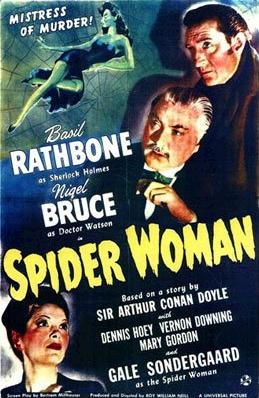
The Spider Woman is a 1943 mystery film starring Basil Rathbone as Sherlock Holmes and Nigel Bruce as Dr. Watson, the seventh of fourteen such films the pair were involved in. As with all of the Universal Studios films in the series, the film is set in then-present day as opposed to the Victorian setting of the original stories. This film incorporates elements from the 1890 novel The Sign of the Four, as well as the short stories "The Final Problem", "The Adventure of the Empty House", "The Adventure of the Speckled Band" and makes explicit reference to "The Adventure of the Devil's Foot".
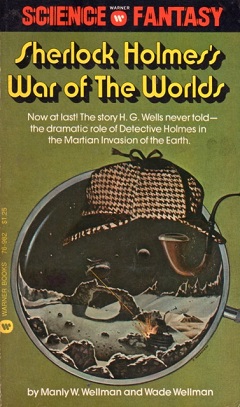
Sherlock Holmes's War of the Worlds is a science fiction novel by American writers Manly Wade Wellman and his son Wade Wellman. A sequel to H. G. Wells's The War of the Worlds, it was published in 1975. It is a pastiche crossover which combines H. G. Wells's 1897 extraterrestrial invasion story with Sir Arthur Conan Doyle's Sherlock Holmes and Professor Challenger characters. The book is composed of stories originally published in The Magazine of Fantasy & Science Fiction.
The Sherlockian game is the pastime of attempting to resolve anomalies and clarify implied details about Sherlock Holmes and Dr. Watson from the 56 short stories and four novels that make up the Sherlock Holmes canon by Arthur Conan Doyle. It treats Holmes and Watson as real people and uses aspects of the canonical stories combined with the history of the era of the tales' settings to construct fanciful biographies of the pair.

Sherlock Holmes: The Unauthorized Biography is a Sherlock Holmes pastiche novel by Nick Rennison, originally published in 2005.
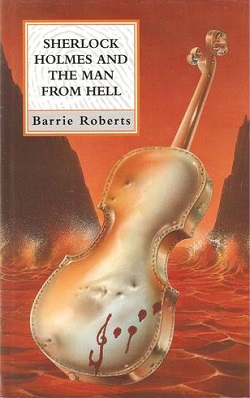
Sherlock Holmes and the Man from Hell is a 1997 Sherlock Holmes pastiche novel by Barrie Roberts. A key character in the story, Lord Backwater, is first mentioned in the short story, "The Noble Bachelor,", also by Holmes creator Arthur Conan Doyle.

Sherlock Holmes and the Shadwell Shadows is a mystery novel by James Lovegrove. It is a Sherlock Holmes pastiche that involves H. P. Lovecraft's Cthulhu Mythos. It is the first book in the Cthulhu Casebooks trilogy. The second novel, Sherlock Holmes and the Miskatonic Monstrosities, was released in November 2017 and the third, Sherlock Holmes and the Sussex Sea-Devils, in November 2018.

Mycroft Holmes is a mystery novel by Kareem Abdul-Jabbar and Anna Waterhouse. It involves Sir Arthur Conan Doyle's character of Mycroft Holmes, the older brother of Sherlock Holmes, solving a mystery early in his career as a government official. It is Abdul-Jabbar's first adult novel.

Dr. Jekyll and Mr. Holmes is a Sherlock Holmes pastiche novel by Loren D. Estleman, originally published in 1979.

Sherlock Holmes: The Army of Dr. Moreau is a Sherlock Holmes pastiche novel by Guy Adams, originally published in 2012. It is Adams' second Sherlock Holmes novel after The Breath of God.

The Return of the Pharaoh: From the Reminiscences of John H. Watson, M.D. is a Sherlock Holmes pastiche novel by Nicholas Meyer, published in 2021. It takes place after Meyer's other Holmes pastiches, The Seven-Per-Cent Solution, The West End Horror, The Canary Trainer and The Adventure of the Peculiar Protocols.
